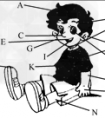根据首字母提示及句意填入适当的单词。 1. I l_____an English-Chinese dictionary to Jim, but he didn't return it to me. 2. You must h_____ in your homework on t-九年级英语
当两种物体之间相互比较时,我们要用形容词或副词的比较级;
当相互比较的物体是三个或三个以上时,我们就要用形容词或副词的最高级。
形容词的比较级和最高级的特殊变化规则:
一、少数单音节词前面加 more-, most- 构成比较级和最高级
tired ---- more tired , most tired
fond ----- more fond , most fond
glad ----- more glad , most glad
bored ---- more bored , most bored
pleased---- more pleased , most pleased
二、不规则变化
good /well------- better ,best
bad/badly/ill------ worse , worst
many/much-------more , most
little ------ less , least
far ---- farther, farthes / firther , furthest
old ---- older , oldest (GA)
---- older , oldest / elder , eldest (GB)
三、下列形容词和副词的比较级和最高级有两种形式
cruel----- crueler, cruelest /more cruel , most cruel
strict---- stricter , strictest /more strict , most strict
often----- oftener , oftenest / more often , most often
friendly------ friendlier , friendliest / more friendly , most friendly
clever----- cleverer, cleverest / more clever , most clever
四、下列形容词和副词没有比较级和最高(即表示”最高程度”或”绝对状态”的形容词和副词没有比较级和最高级)
empty , wrong , perfect , unique , extreme , excellent , favourite (GB)/ favorite (GA) , true , right , correct , extremely ...
形容词比较等级用法:
1.没有比较对象时,用原级。
I have a new computer.
2.两者比较,程度相同。
A+系动词+as+adj.+as+B.
Our school is as beautiful as theirs.
3.两者比较,程度不同。
A+系动词+not as+adj.+as+B.
The weather here is not as hot as that in the south.
4.A比B更…
The earth is bigger than the moon.
5.比较级前可以用much,even,still,far,a lot,a little,a bit,any等修饰。
Your room is much bigger than mine.
I’m a little shorter than her.
6.用比较级可以表示最高级含义:
John is stronger than any other boy in his class.=John is stronger than any of the other boys.
两者不属于同一范畴,不能用other.
Chongqing is bigger than any city in Sichuang.
7.“比较级+and+比较级” 表示“越来越…”
China is becoming more and more beautiful.
Days are getting longer and longer.
8.用the+比较级,the+比较级 表示”越…就越…”.
The busier he is, the happier he feels.
9. Which/Who+is+比较级 A或B?
A和B哪一个/谁更…?
Which is better,this one or that one?
最高级用法:
表示三者或三者以上的人或物的比较,一个在某方面超过其他两个或多个时,用最高级,结构是
主语+系动词+the+形容词最高级+of/in短语。
This story is the most interesting of the three.
1. one of the+形容词最高级+名词复数
它的意思是最…之一。
English is one of the most important languages in the world.
2. which/who…+is+形容词最高级
“…最...”
Which is the heaviest,the horse,the sheep or the elephant?
3.最高级前可以用序数词
The Yellow River is the second longest river in China.
|
构成 |
原级 |
比较级 |
最高级 |
|
一般加er,est |
tall |
taller |
tallest |
|
以字母e结尾只 |
large |
larger |
largest |
|
以一个辅音字母结尾的 |
red |
redder |
reddest |
|
hot |
hotter |
hottest | |
|
thin |
thinner |
thinnest | |
|
|
easy |
easier |
easiest |
|
happy |
happier |
happiest | |
|
ugly |
uglier |
ugliest | |
|
early |
earlier |
earliest | |
|
其他双音节词和多 |
interesting |
more interesting |
most interesting |
考点名称:实义动词的过去式
- 表示一般过去式的动词通常用动词的过去式形式来表示,而动词的过去式是在动词原形的基础上变化的。
动词的过去式可分为规则动词和不规则动词。 实意动词过去式变化规则:
注:以l结尾的动词,尾音节重读时,双写l,如control—controlled;分类 构成 例句 一般情况下 在词尾直接加ed ask—asked
work—worked以不发音的e结尾 只加d love—loved
dance—danced
以辅音字母加y结尾 变y为i,再加-ed try—tried
study—studied以一个元音字母和一个辅音结尾的
重读音节结尾的动词先双写末尾一个字母,再加ed stop—stopped
permit—permitted“-ed”的读音规则 1.在清辅音后面读[t],如:help—helped[helpt]
2.在浊辅音或元音后读[d],如:learn—learned
3.在[t]和[d]后读[id],如:want—wantedneed—needed
尾音节不重读时,双不双写都可以,如travel—traveled/traveled。
特例:picnic—picnicked,另外还有很多动词的过去式是不合乎上述规则的,常见的有:
常用的有:
begin—began, bring—brought, come—came, draw—drew,
drink—drank, drive—drove, eat—ate, feel—felt,
get—got, give—gave, go—went, grow—grew,
have (has)—had, keep—kept, know—knew, leave—left,
- 最新内容
- 相关内容
- 网友推荐
- 图文推荐
| [家长教育] 孩子为什么会和父母感情疏离? (2019-07-14) |
| [教师分享] 给远方姐姐的一封信 (2018-11-07) |
| [教师分享] 伸缩门 (2018-11-07) |
| [教师分享] 回家乡 (2018-11-07) |
| [教师分享] 是风味也是人间 (2018-11-07) |
| [教师分享] 一句格言的启示 (2018-11-07) |
| [教师分享] 无规矩不成方圆 (2018-11-07) |
| [教师分享] 第十届全国教育名家论坛有感(二) (2018-11-07) |
| [教师分享] 贪玩的小狗 (2018-11-07) |
| [教师分享] 未命名文章 (2018-11-07) |






